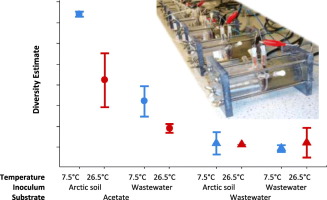Bioelectrochemistry ( IF 4.8 ) Pub Date : 2017-07-22 , DOI: 10.1016/j.bioelechem.2017.07.006 E S Heidrich 1 , J Dolfing 1 , M J Wade 1 , W T Sloan 2 , C Quince 3 , T P Curtis 1

|
The factors that affect microbial community assembly and its effects on the performance of bioelectrochemical systems are poorly understood. Sixteen microbial fuel cell (MFC) reactors were set up to test the importance of inoculum, temperature and substrate: Arctic soil versus wastewater as inoculum; warm (26.5 °C) versus cold (7.5 °C) temperature; and acetate versus wastewater as substrate. Substrate was the dominant factor in determining performance and diversity: unexpectedly the simple electrogenic substrate delivered a higher diversity than a complex wastewater. Furthermore, in acetate fed reactors, diversity did not correlate with performance, yet in wastewater fed ones it did, with greater diversity sustaining higher power densities and coulombic efficiencies. Temperature had only a minor effect on power density, (Q10: 2 and 1.2 for acetate and wastewater respectively): this is surprising given the well-known temperature sensitivity of anaerobic bioreactors. Reactors were able to operate at low temperature with real wastewater without the need for specialised inocula; it is speculated that MFC biofilms may have a self-heating effect. Importantly, the warm acetate fed reactors in this study did not act as direct model for cold wastewater fed systems. Application of this technology will encompass use of real wastewater at ambient temperatures.
中文翻译:

温度、接种物和底物:对比微生物燃料电池中的电活性联合体、多样性和性能
影响微生物群落组装的因素及其对生物电化学系统性能的影响知之甚少。建立了 16 个微生物燃料电池 (MFC) 反应器来测试接种物、温度和基质的重要性:北极土壤与作为接种物的废水;暖 (26.5 °C) 与冷 (7.5 °C) 温度;和醋酸盐与废水作为底物。底物是决定性能和多样性的主要因素:出乎意料的是,简单的生电底物比复杂的废水具有更高的多样性。此外,在醋酸盐进料反应器中,多样性与性能无关,但在废水进料反应器中却如此,更大的多样性维持更高的功率密度和库仑效率。温度对功率密度的影响很小,(Q乙酸盐和废水分别为10 : 2 和 1.2):鉴于厌氧生物反应器众所周知的温度敏感性,这令人惊讶。反应器能够在低温下处理真正的废水,而不需要专门的接种物;推测MFC生物膜可能具有自热效应。重要的是,本研究中的暖醋酸盐进料反应器并未作为冷废水进料系统的直接模型。这项技术的应用将包括在环境温度下使用真正的废水。











































 京公网安备 11010802027423号
京公网安备 11010802027423号